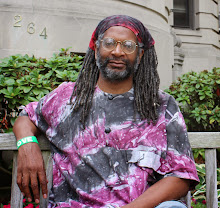EWTN “Women of Grace” blog: Is Paranormal State TV for Real?
 |
| Vun, the Spirit of Fire, is the portal to the Ancestors in the Dagara tradition of West Africa. |
My reply to their post is as follows- “waiting for moderation” (ok fine, it is more than the one paragraph that they suggest, but then there were more than one in the accepted comment on the page....Susan Brinkman can come talk to us here if the WOG blog can’t handle the bandwidth...I’d love to continue the discussion of such things with her and any others so interested and inclined, but I progress):
I have also noticed the great proclivity for drama to be a constant creation in shows such as these, as it is in most, if not all (sur)reallity tv. This is the first mistake of shows like this. The connection to human spirits who have passed over can be unsettling as those spirits can be truly unsettled and frustrated and in our midst, but the melodrama around it is not helpful to understanding out traditional responses to assisting those spirits, our Ancestors in their successful passage to the realm of the Ancestors. Thank you for pointing out one of the fundamental problems with these types of programs in general.
There are, though, problems with the above characterization of these spiritual dynamics:
"First, let me say that I believe homes can be haunted and that spirits can toss around frying pans in the middle of the night. But I don’t believe that these events are due to the behavior of the deceased owner of the house who got lost somewhere between here and eternity and is roaming the halls looking for peace. This is pure theater. Disembodied souls don’t have voices that can be recorded on EVP meters, not only because their voiceboxes have long ago rotted in the grave, but because our God, who loves us beyond our comprehension, doesn’t let any of his beloved creatures “get lost” on the way to eternity."
If we take spiritual energy as purely that (and we know the implications are deep here), we know that energy is conserved, transformed, not deleted or destroyed. Why then is it impossible to conceive that that human energetic imprint or spirit can not then have a corporeal effect, still, on the potential energy in the movement of objects or emotions or human sensation? It only makes logical, rational sense that that would be entirely possible, in addition to the multiplicity of occurrences outside of televisual narratives that confirm these dynamics, especially in traditional and indigenous contexts (even modern ones where people have not shut down their full range of human energetic awareness) where many thousands of years of communal energetic learning, awareness and experience give grounding to such experiences in a functional and integrated way. This is why so many, many indigenous cultures have traditions, rituals and ceremonies for engaging and reconciling energies and spiritual dynamics in the Ancestral continuum. Malidoma Some' asserts eloquently in "Healing Wisdom of Africa" that we are in such grave straits in the modern world precisely because we have forgotten and neglected (and been terrorized away from) our Ancestral relationships.
In addition, the multi-dimensionality of the universe must be taken into consideration when we speak of being able to hear spirits or Ancestors, those that have died. Of course they don't have voice-boxes. That's a simplistic argument, but it is wholly dismissive of energetic reality to suggest that we are limited to the creation of sound pressure only in the normal physiological sense. This is why we call it SUPERnatural or metaphysical! Nor should we assume that our human ability to hear is only limited to the ear. Again, that is simplistic in a world that largely agrees that we can see with the mind's eye. The learned (and coerced) limitations that many of us acknowledge are exactly why we dismiss Ancestral energetic dynamics in the face of "rational", "scientific" objectivism. It is pure folly and ignorance to relegate ourselves to "Avatar" science, thinking based upon the requirement to have energetic dynamics show up on meters or machines to be real or reliable. Clearly, though, study and experience shows that this can happen, but it is not the only way that these dynamics can be substantiated. I am sure there are countless Roman Catholics who can speak to the presence of their deceased loved ones in their midst with great assuredness and clarity.
The other issue that can and must be engaged here is that so many cultures do have the experience and awareness of souls being "lost" if the correct energetic work is not done or if our relationships to them are broken or out of balance. The cultural perspective from which the Roman Catholic viewpoint is derived is not the only valid one on the earth. To wholly dismiss the tens of thousands of years old (and beyond) cultural perspectives, wisdom, experience and knowledge of indigenous peoples would be clearly arrogant and ethnocentric at best. That primary human legacy cannot be undone with the writings of one particular culture, just as the rantings of the Sanhedrin and the Pharisees did not necessarily make Jesus's statements and perspectives wrong.
We are on the right track with critiquing television programs that misappropriate and distort spiritual phenomena, but we are gravely mistaken when we provide narrow and simplistically dismissive filtered reads to time-proven, functional and expansive human cultural narratives.
[reposted also on my facebook page]





